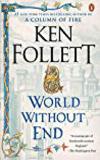
The Pillars of the Earth was quite a ride of historical fiction, introducing us the people of a small English city of Kingsbridge in the 12th century. When I learned that there was a sequel (World Without End) set in the same town but hundreds of years later, I was intrigued. A timeskip with the same setting but different (descended) characters hundreds of years later isn’t something I’ve often seen and it’s fascinating when done well. Add in that World Without End is set during the years of the Plague… I was intrigued.
For the most part, World Without End did well. It has big shoes to fill following up to Pillars of the Earth. In comparison, the building seems smaller (a bridge and a tower instead of the entire cathedral), the conflicts seem smaller and more petty, and the characters feel more anachronistic. There are any number of times when I wonder if people of the time period were really that ‘modern’ or is that an invention of Follett.
Characterwise, there wasn’t a Phillip, which was a bummer. For the most part, all of the monks this time around were corrupt or non-entities. And not even subtly so. The Evil Earl isn’t quite as evil as William and I mostly don’t understand how he can be so thick and not get shot in the back long before by his own men.
Of the main characters and the big romances through the whole thing… eh. Caris annoyed me thoroughly with her inability to actually take a stand one way or another Merthin pined for Caris through the years, although for a while at least he got away from it all.
“I don’t have a plan, you fool. I just know I don’t want to have a baby.”
“So you don’t have a plan, and I’m a fool and a weakling. Do you want anything from me?”
“No!”
“Then what are you doing here?”
“Don’t be so logical!”
I don’t get it. I feel they could be so much happier otherwise.
Wulfric is solid and simple, but not too bright. Gwenda … tries? There is no one that I cared for nearly as much as I did for Philip and even Jack and his family the first time around. It weakens what was Pillars of the Earth’s real strength.
Knowing that the Plague happened during the years of this book was interesting. I kept waiting for it to show up and when it did and people started falling left and right, there was just the right amount of the feeling of hopelessness, along with annoyance at the monks and their medical practices of the time.
And the subplot with Thomas and the mysterious letter, right from the first pages? Based on a mostly real thing Fieschi Letter and a real person (Sir Thomas Gurney, there was a real but not related Thomas Langley at the time), but mostly fictionalized. And in the end… did that plotline even matter? At least in Pillars of the Earth we got more closure.
So it goes. Still a fascinating read. I’m really curious to see where A Column of Fire takes Kingsbridge, right in the middle of the Protestant Reformation. It has potential. And a currently unpublished prequel The Evening and the Morning, set at the end of the Dark Ages. It’s making me want to find and read other historical fiction. The real world can be as strange and interesting as any fantastical world. A good thing to mix in.